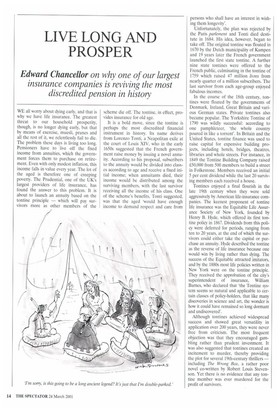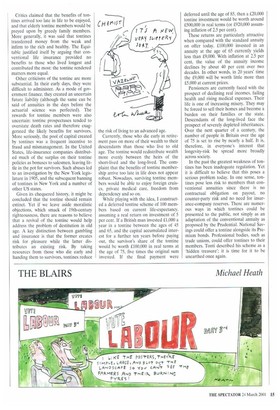LIVE LONG AND PROSPER
Edward Chancellor on why one of our largest
insurance companies is reviving the most discredited pension in history
WE all worry about dying early, and that is why we have life insurance. The greatest threat to our household prosperity, though, is no longer dying early, but that by means of exercise, muesli, prunes and all the rest of it, we relentlessly fail to die. The problem these days is living too long. Pensioners have to live off the fixed income from annuities, which the government forces them to purchase on retirement. Even with only modest inflation, this income falls in value every year. The lot of the aged is therefore one of creeping poverty. The Prudential, one of the UK's largest providers of life insurance, has found the answer to this problem. It is about to launch an annuity based on the tontine principle — which will pay survivors more as other members of the scheme die off. The tontine, in effect, provides insurance for old age.
It is a bold move, since the tontine is perhaps the most discredited financial instrument in history. Its name derives from Lorenzo Tonti, a Neapolitan exile at the court of Louis XIV, who in the early 1650s suggested that the French government raise money by issuing a novel annuity. According to his proposal, subscribers to the annuity would be divided into classes according to age and receive a fixed initial income; when annuitants died, their income would be distributed among the surviving members, with the last survivor receiving all the income of his class. One of the scheme's benefits, Tonti suggested, was that the aged 'would have enough income to demand respect and care from persons who shall have an interest in wishing them longevity'.
Unfortunately, the plan was rejected by the Paris parlernent and Tonti died destitute in 1684. His idea, however, began to take off. The original tontine was floated in 1670 by the Dutch municipality of Kampen and 19 years later the French government launched the first state tontine. A further nine state tontines were offered to the French public, culminating in the tontine of 1759 which raised 47 million livres from nearly quarter of a million subscribers. The last survivor from each age-group enjoyed fabulous incomes.
In the course of the 18th century, tontines were floated by the governments of Denmark, Ireland, Great Britain and various German states. Private tontines also became popular. The Yorkshire Tontine of 1790 was wildly successful: according to one pamphleteer, 'the whole country poured in like a torrent'. In Britain and the United States, tontine finance was used to raise capital for expensive building projects, including hotels, bridges, theatres, libraries and whole streets. For instance, in 1849 the Tontine Building Company raised £50,000 from 500 members to build a street in Folkestone. Members received an initial 5 per cent dividend while the last 20 surviving members each received a house.
Tontines enjoyed a final flourish in the late 19th century when they were sold aggressively by American life-insurance companies. The keenest proponent of tontine life insurance was the Equitable Life Assurance Society of New York, founded by Henry B. Hyde, which offered its first tontine policy in 1867. Dividends from this policy were deferred for periods, ranging from ten to 20 years, at the end of which the survivors could either take the capital or purchase an annuity. Hyde described the tontine as the reverse of life insurance because one would win by living rather than dying. The success of the Equitable attracted imitators, and by the 1880s most life policies written in New York were on the tontine principle. They received the approbation of the city's superintendent of insurance, William Barnes, who declared that 'the Tontine system seems so natural and applicable to certain classes of policy-holders, that like many discoveries in science and art, the wonder is how it could have remained so long dormant and undiscovered'.
Although tontines achieved widespread success and showed great versatility in application over 200 years, they were never free from criticism. The most frequent objection was that they encouraged gambling rather than prudent investment. It was also suggested that tontines created an incitement to murder, thereby providing the plot for several 19th-century thrillers — including The Wrong Box, a rather poor novel co-written by Robert Louis Stevenson. Yet there is no evidence that any tontine member was ever murdered for the profit of survivors.
Critics claimed that the benefits of tontines arrived too late in life to be enjoyed, and that elderly tontine members would be preyed upon by greedy family members. More generally, it was said that tontines transferred money from the weak and infirm to the rich and healthy. The Equitable justified itself by arguing that conventional life insurance provided no benefits to those who lived longest and contributed the most: the tontine rendered matters more equal.
Other criticisms of the tontine are more substantial. In their early days, they were difficult to administer. As a mode of government finance, they created an uncertain future liability (although the same can be said of annuities in the days before the actuarial science was perfected). The rewards for tontine members were also uncertain: tontine prospectuses tended to overstate death rates and therefore exaggerated the likely benefits for survivors. More seriously, the pool of capital created by tontines was a frequent incentive to fraud and mismanagement. In the United States, life-insurance companies distributed much of the surplus on their tontine policies as bonuses to salesmen, leaving little in the pot for survivors. Such abuses led to an investigation by the New York legislature in 1905, and the subsequent banning of tontines in New York and a number of other US states.
Given its chequered history, it might be concluded that the tontine should remain extinct. Yet if we leave aside moralistic objections, which smack of 19th-century righteousness, there are reasons to believe that a revival of the tontine would help address the problem of destitution in old age. A key distinction between gambling and insurance is that the former creates risk for pleasure while the latter distributes an existing risk. By taking resources from those who die early and handing them to survivors, tontines reduce
the risk of living to an advanced age.
Currently, those who die early in retirement pass on more of their wealth to their descendants than those who live to old age. The tontine would redistribute wealth more evenly between the heirs of the short-lived and the long-lived. The complaint that the benefits of tontine membership arrive too late in life does not appear robust. Nowadays, surviving tontine members would be able to enjoy foreign cruises, private medical care, freedom from dependency and so on.
While playing with the idea, I constructed a deferred tontine scheme of 100 members based on current life-expectancy, assuming a real return on investment of 5 per cent. If a British man invested £1,000 a year in a tontine between the ages of 45 and 65, and the capital accumulated interest for a further ten years before paying out, the survivor's share of the tontine would be worth £100,000 in real terms at the age of 75, five times the original sum invested. If the final payment were deferred until the age of 85, then a £20,000 tontine investment would be worth around £500,000 in real terms (or £920,000 assuming inflation of 2.5 per cent).
These returns are particularly attractive when compared with the standard annuity on offer today. £100,000 invested in an annuity at the age of 65 currently yields less than £9,000. With inflation at 2.5 per cent, the value of the annuity income declines by about 40 per cent over two decades. In other words, in 20 years' time the £9,000 will be worth little more than £5,000 at current prices.
Pensioners are currently faced with the prospect of declining real incomes, failing health and rising medical expenses. Their life is one of increasing misery. They may be forced to sell their homes and become a burden on their families or the state. Descendants of the long-lived face the prospect of severely depleted inheritances. Over the next quarter of a century, the number of people in Britain over the age of 75 is set to rise by nearly a half. It is, therefore, in everyone's interest that longevity-risk be spread more broadly across society.
In the past the greatest weakness of tontines has been inadequate regulation. Yet it is difficult to believe that this poses a serious problem today. In one sense, tontines pose less risk to members than conventional annuities since there is no contractual obligation on payout, no counter-party risk and no need for insurance-company reserves. There are numerous ways in which tontines could be presented to the public, not simply as an adaptation of the conventional annuity as proposed by the Prudential. National Savings could offer a tontine alongside its Premium bonds. Professional bodies, such as trade unions, could offer tontines to their members. Tonti described his scheme as a 'hidden treasure'; it is time for it to be unearthed once again.















































































 Previous page
Previous page